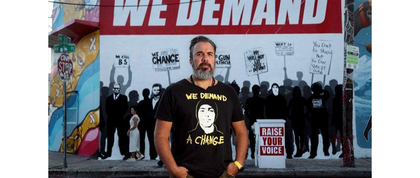
Pictured: Manuel Oliver in front of one of his murals (South Florida Sun Sentinel)
Dear Colleagues and Students:
Today I write from the University of Maryland School of Public Health where I’ve joined researchers, advocates and foundation leaders from across the nation at a three-day meeting, Gun Violence Prevention: A National Research Collaboration Summit. Supported by the Association of Schools and Programs of Public Health (ASPPH), this event has an ambitious goal: to identify what we need to know about people, society and statutes to sharply curb the epidemic of gun morbidity and mortality in the U.S.
This summit has been dedicated to Dr. Jeremy Richman, whose daughter Avielle lost her life at Sandy Hook Elementary School, and who sadly ended his own life last month. The foundation created in Avielle’s memory by her parents to advance gun control will continue. To remind us of all the victims of gun violence and our important task at hand, a “memory chair” (below) has faced us, draped in white and bearing an orange ribbon, as we deliberated.
This gathering could not have been more timely. Last Saturday, we marked the 20th anniversary of the 1999 mass shooting at Columbine High School in Littleton, Colorado. Many are asking what has improved over the past two decades, and what most urgently can be done with regard to research and policy change? We’re determined to narrow the gap between what we know and what policy makers actually do.
I have been extremely inspired by the work of Po Murray, who leads the Newtown Action Alliance (NAA) that works to achieve the steady and continuous reduction of gun violence through legislative and cultural changes.
On a state policy level, there’s both good and bad news. More states are tightening laws to protect those at risk of domestic violence and funding programs to prevent violence. With regard to both these important areas, huge gaps in knowledge exist because of the long, pernicious moratorium on research imposed by the Dickey Amendment.
But there is also very troubling news.
It is a disturbing fact that too many of our elected officials remain heavily influenced by the National Rifle Association — so much so that both President Trump and Vice President Pence spoke before their annual convention today in Indianapolis where it was announced that plans have been abandoned to ratify the U.N. Arms Trade Treaty (United Press International).
And despite the opposition of parents and students, lawmakers in Florida this week moved closer to lifting a ban on arming and training teachers to carry weapons in their classrooms — a measure that once would have seemed inconceivable. (New York Times)
Recently, research concluded that Florida's Stand Your Ground law was followed by an uptick in unlawful homicide (see below). Sadly, if passed, the policy to arm teachers may have similar unintended effects.

To begin to heal his family's pain, Manuel Oliver (pictured above), whose son, Joaquin, was gunned down at Marjory Stoneman Douglas High School, has sought to turn adversity into action, advocating for sane gun policy here in the U.S. and painting murals to honor his son’s memory and spark change. For example, one mural pictured his son receiving his death certificate in lieu of a high school diploma.
In February, Oliver was among those whom a representative from Florida attempted to rudely eject from a congressional hearing on gun violence prevention measures, as the congressman attempted to hijack the discussion away from the need for background checks to a border wall (CNN).
From a personal perspective, I always find it fascinating to watch activists and academics interact with one another.
In my humble opinion, we need each other far more than we realize.
![]()
Cheryl Healton, DrPH
Dean
For more information on gun violence statistics, please visit the Giffords Law Center to Prevent Gun Violence.
